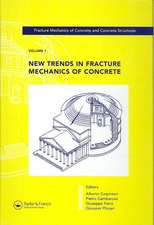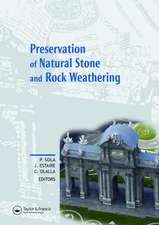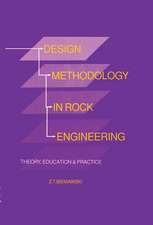Structural Mechanics
Autor D. Williams, Frank Durka, Hassan Al Nageim, W. Morganen Limba Engleză Paperback – 10 iun 2010
The seventh edition has been revised to provide up-to-date design guidance, principles in line with the current British Standards and Euro codes. It clarifies the content with updated design examples and a new setting of the text throughout. The original simplicity of the mathematical treatment has been maintained, while more emphasis on the relevance of structural mechanics to the process of structural design, analysis, materials, loads on building and structures according to the current British Standard and European code of Practice.
The initial chapters of the book deal with the concept of loads and their effects on structural materials and elements in terms of stress and strain. The significance of the shape of the cross-section of structural elements is then considered. The book finishes with the design of simple structural elements such as beams, columns, rafters, portal frames, dome frames and gravity retaining walls.
Key Features:
· emphasizes full understanding of the basic principles rather than mathematical agility
· provides more worked examples for structure of elements and practical body design method and solutions with many problems to enhance comprehension
· includes relevant tables and British Standards and European code for designing structural elements
· cover durability, stability of structures including explanation of corrosion of steel bars in reinforced concrete elements.
· covers the design of timber, steel and concrete beams and columns to the British Standards and European codes.
· covers BTEC Higher National Unit 8162E on structural mechanics
Structural Mechanics is a core text for the BTEC structural mechanics unit for NC/D building studies and construction, HNC/D building and civil engineering studies, as well as first and second year degree courses in building, civil engineering, building surveying, surveying and architecture.
Hassan AL Nageim is a Chartered Engineer and Professor of Structural Engineering at Liverpool John Moores University, Liverpool, UK.
Preț: 575.86 lei
Preț vechi: 661.91 lei
-13% Nou
Puncte Express: 864
Preț estimativ în valută:
110.19€ • 115.05$ • 91.20£
110.19€ • 115.05$ • 91.20£
Carte disponibilă
Livrare economică 15-29 martie
Livrare express 01-07 martie pentru 43.95 lei
Preluare comenzi: 021 569.72.76
Specificații
ISBN-13: 9780132239646
ISBN-10: 0132239647
Pagini: 456
Ilustrații: Illustrations
Dimensiuni: 189 x 246 x 27 mm
Greutate: 0.88 kg
Ediția:Nouă
Editura: Pearson Education (US)
Locul publicării:Harlow, United Kingdom
ISBN-10: 0132239647
Pagini: 456
Ilustrații: Illustrations
Dimensiuni: 189 x 246 x 27 mm
Greutate: 0.88 kg
Ediția:Nouă
Editura: Pearson Education (US)
Locul publicării:Harlow, United Kingdom
Descriere
Structural Mechanics, first published in 1958, has become established as a classic text on the theory of structures and design methods of structural members. The book clearly and logically presents the subject's basic principles, keeping the mathematical content to its essential minimum.
The seventh edition has been revised to provide up-to-date design guidance, principles in line with the current British Standards and Eurocodes. The original simplicity of the mathematical treatment has been maintained, while more emphasis on the relevance of structural mechanics to the process of structural design, analysis, materials, loads on building and structures according to the current British Standard and European Code of Practice.
The initial chapters of the book deal with the concept of loads and their effects on structural materials and elements in terms of stress and strain. The significance of the shape of the cross-section of structural elements is then considered before the book finishes with the design of simple structural elements such as beams, columns, rafters, portal frames, dome frames and gravity retaining walls.
The seventh edition has been revised to provide up-to-date design guidance, principles in line with the current British Standards and Eurocodes. The original simplicity of the mathematical treatment has been maintained, while more emphasis on the relevance of structural mechanics to the process of structural design, analysis, materials, loads on building and structures according to the current British Standard and European Code of Practice.
The initial chapters of the book deal with the concept of loads and their effects on structural materials and elements in terms of stress and strain. The significance of the shape of the cross-section of structural elements is then considered before the book finishes with the design of simple structural elements such as beams, columns, rafters, portal frames, dome frames and gravity retaining walls.
Cuprins
1. Introduction
2. Loads on buildings and structures
3. Concurrent coplanar forces
4. Non-concurrent coplanar forces
5. Moments of forces
6. Framed structures
7. Construction materials
8. Shear force and bending moment
9. Properties of sections
10. Introduction to structural stability, durability and environmental conditions
11. Simple beam design to BS 5950, BS 5268, EC3 and EC5
12. Beams of two materials
13. Deflection of beams
14. Axially loaded columns
15. Connections to BS 5950 and EC3
16. Addition of direct and bending stresses
17. Portal frames and arches
18. Gravity retaining walls
2. Loads on buildings and structures
3. Concurrent coplanar forces
4. Non-concurrent coplanar forces
5. Moments of forces
6. Framed structures
7. Construction materials
8. Shear force and bending moment
9. Properties of sections
10. Introduction to structural stability, durability and environmental conditions
11. Simple beam design to BS 5950, BS 5268, EC3 and EC5
12. Beams of two materials
13. Deflection of beams
14. Axially loaded columns
15. Connections to BS 5950 and EC3
16. Addition of direct and bending stresses
17. Portal frames and arches
18. Gravity retaining walls
Notă biografică
Hassan Al Nageim is a Chartered Engineer and Professor of Structural Engineering at Liverpool John Moores University, Liverpool, UK.
Textul de pe ultima copertă
Structural Mechanics was first published in 1958 and has become established as a classic text on the theory of structures and design methods of structural members. The book clearly and logically presents the subject's basic principles and keeps the mathematical content to its essential minimum.
The seventh edition has been revised to provide up-to-date design guidance in line with the current British Standards and Eurocodes. The original simplicity of the mathematical treatment has been maintained, while more emphasis has been placed on the relevance of structural mechanics to the process of structural design, analysis, materials, loads on building and structures.
The initial chapters of the book deal with the concept of loads and their effects on structural materials and elements in terms of stress and strain. The significance of the shape of the cross-section of structural elements is then considered before the book finishes with the design of simple structural elements such as beams, columns, rafters, portal frames, dome frames and gravity retaining walls.
Key Features:
· covers the design of timber, steel and concrete beams and columns to the current British Standards and Eurocodes
· emphasizes full understanding of the basic principles rather than mathematical agility
· worked examples for structure of elements and practical body design method and solutions with many exercises to enhance comprehension
· includes relevant tables, British Standards and Eurocodes for designing structural elements
· covers durability and stability of structures, including explanation of corrosion of steel bars in reinforced concrete elements
Structural Mechanics is a core text for the BTEC structural mechanics unit for NC/D building studies and construction, HNC/D building and civil engineering studies, as well as first and second year degree courses in building, civil engineering, surveying and architecture.
Hassan Al Nageim is a Chartered Engineer and Professor of Structural Engineering at Liverpool John Moores University, Liverpool, UK.
The seventh edition has been revised to provide up-to-date design guidance in line with the current British Standards and Eurocodes. The original simplicity of the mathematical treatment has been maintained, while more emphasis has been placed on the relevance of structural mechanics to the process of structural design, analysis, materials, loads on building and structures.
The initial chapters of the book deal with the concept of loads and their effects on structural materials and elements in terms of stress and strain. The significance of the shape of the cross-section of structural elements is then considered before the book finishes with the design of simple structural elements such as beams, columns, rafters, portal frames, dome frames and gravity retaining walls.
Key Features:
· covers the design of timber, steel and concrete beams and columns to the current British Standards and Eurocodes
· emphasizes full understanding of the basic principles rather than mathematical agility
· worked examples for structure of elements and practical body design method and solutions with many exercises to enhance comprehension
· includes relevant tables, British Standards and Eurocodes for designing structural elements
· covers durability and stability of structures, including explanation of corrosion of steel bars in reinforced concrete elements
Structural Mechanics is a core text for the BTEC structural mechanics unit for NC/D building studies and construction, HNC/D building and civil engineering studies, as well as first and second year degree courses in building, civil engineering, surveying and architecture.
Hassan Al Nageim is a Chartered Engineer and Professor of Structural Engineering at Liverpool John Moores University, Liverpool, UK.
Caracteristici
· covers the design of timber, steel and concrete beams and columns to the British Standards and European codes
· emphasizes full understanding of the basic principles rather than mathematical agility
· provides more worked examples for structure of elements and practical body design method and solutions with many problems to enhance comprehension
· includes relevant tables and British Standards and European code for designing structural elements
· cover durability, stability of structures including explanation of corrosion of steel bars in reinforced concrete elements
· emphasizes full understanding of the basic principles rather than mathematical agility
· provides more worked examples for structure of elements and practical body design method and solutions with many problems to enhance comprehension
· includes relevant tables and British Standards and European code for designing structural elements
· cover durability, stability of structures including explanation of corrosion of steel bars in reinforced concrete elements

























